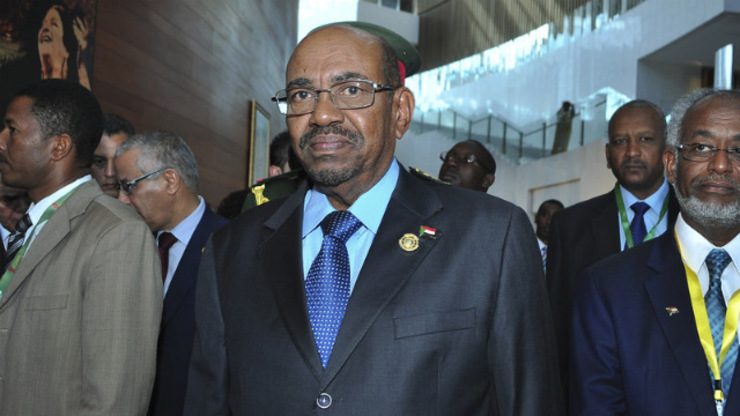SUMMARY
This is AI generated summarization, which may have errors. For context, always refer to the full article.

KHARTOUM, Sudan – A quarter-century after it took power in an Islamist-backed coup promising “salvation” for Sudan, critics say Field Marshal Omar al-Bashir’s regime has instead destroyed it.
Bashir, 70, is accused of war crimes in the Darfur region and has maintained power despite internal divisions within his ruling National Congress Party (NCP).
He presides over a country where the number of people needing food and other aid rose 40% over the past year and millions have been displaced by the wars and unrest which have touched about half of Sudan’s states.
The country’s image sank even lower in May when a judge sentenced a pregnant Christian woman to hang for “apostasy,” a ruling later overturned but which sparked an outcry from Western governments and human rights groups.
Sudan is bereft of hard currency, internationally isolated and billions of dollars in debt, ranking near bottom in global measures of human development, perceived corruption and press freedom.
Many of Sudan’s 34 million people live in houses made of mud brick while workers put the final touches to a new presidential palace near the banks of the Blue Nile.
Across from Khartoum’s airport, a tower is rising to house the ruling party – paid for by its members and not public money, says an NCP official.
“They ruined the country,” laments a senior opposition politician.
“They divided the country – civil wars, sectarianism, fundamentalism. They impoverished the country – a lot of corruption. So many injustices.”
Bashir took power 25 years ago on the night of June 30, 1989, when paratroops and army engineers overthrew the coalition government of Sadiq al-Mahdi in a bloodless coup.
Mahdi’s government was a rare democratic interlude for a country that had already spent years under military leaders.
But sit-ins, strikes and power outages paralyzed the economy during his “totally dysfunctional” rule, Bashir adviser Amin Hassan Omer wrote this month in the pan-Arab newspaper Asharq Al-Awsat.
“It became normal for people to stand in line for bread, fuel and other consumer goods,” putting the country in need of “Ingaz” (salvation), Omer wrote.
Initially, Ingaz offered hope to Sudan’s people, a former high-ranking government official said.
Oil, roads, schools
“This is what we had in mind. And I think in a way we proved to them that we could do that,” the former official told Agence France-Presse (AFP), referring to oil and development projects which occurred despite United States sanctions that began in 1997.
Roads were built, telecommunications expanded, hospitals and health centers became available, while school and university admissions rose, Bashir’s top assistant, Ibrahim Ghandour, told AFP in a March interview.
“You can’t eat roads,” counters Siddig Yousif, a member of the opposition Communist Party’s central committee, blaming Ingaz for the decline of Sudanese agriculture.
“They destroyed everything,” he said, citing the decay of Sudan’s rail network, the demise of its shipping line, and the sell-off of the national airline in an atmosphere of “total corruption.”
The start of oil production in the late 1990s brought years of economic growth before the fiscal shock of South Sudan’s separation three years ago.
The South split with 75% of the country’s oil production, depriving Khartoum of most of its export earnings. As a result, the Sudanese pound has lost around 60% of its value since late 2011, while inflation has hovered near 40% for months.
Tens of thousands of Sudanese have left the country to seek better opportunities abroad.
Austerity measures led to cuts in health and education budgets but the oil loss “could have been mitigated” had the government diversified the economy during the oil boom, a March report by the United Nations Development Programme said.
Wealth and power have been concentrated in the country’s central region, leading to complaints among non-Arab groups in the periphery of neglect and discrimination.
From the 11-year-old rebellion in Darfur, to South Kordofan and Blue Nile, and the 22-year civil war which ended in South Sudan’s independence, all of Sudan’s armed conflicts have been fuelled by similar grievances.
Wanted for ‘war crimes’
“There is war in Darfur. There is war in Blue Nile, in South Kordofan. What have they done good for the people?” asked University of Khartoum political scientist El Shafie Mohammed El Makki.
He blames the regime for the loss of South Sudan.
Violence against civilians in Darfur led the Hague-based International Criminal Court to issue a warrant for Bashir’s arrest on suspicion of war crimes, crimes against humanity and genocide.
Many analysts suspect that fear of being turned over to the ICC has helped prolong Bashir’s stay in office.
Unrest in Darfur has been its worst in a decade in 2014, while a 3-year war in South Kordofan has intensified.
Even the capital Khartoum has been stained by bloodshed.
After the government slashed petrol subsidies in September 2013, thousands took to the streets calling for the government’s overthrow. Dozens were gunned down.
Facing accusations that the country was on the verge of collapse, Bashir appealed in January for a national political dialogue.
Critics say the aim is not real reform but preservation of the regime.
Hassan al-Turabi, a powerful Islamist behind the 1989 coup, broke with Bashir a decade later and founded the opposition Popular Congress Party.
In a 2012 interview, Turabi told AFP that Bashir “never spent 5 minutes organizing the coup” and was put up as a front-man who did not follow through on the Islamists’ programs for “democratization” and decentralization.
“He ignores his own constitution… He never reads it. He’s a soldier. Soldiers are awful people,” Turabi said. – Rappler.com
Add a comment
How does this make you feel?
There are no comments yet. Add your comment to start the conversation.